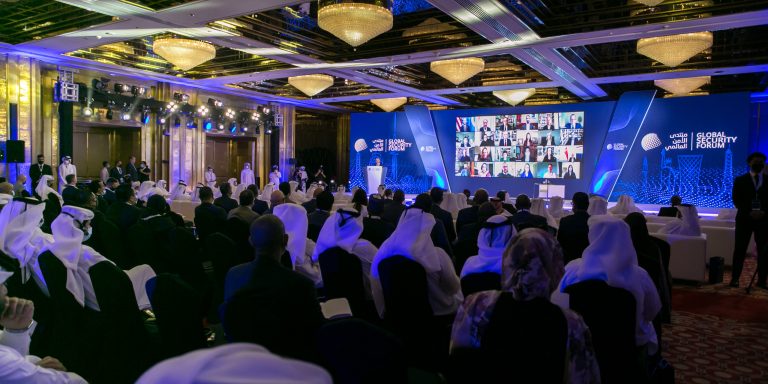INTELBRIEF
March 13, 2023
IntelBrief: Reshaping the Global Order: Global Security Forum Kicks Off in Doha

Bottom Line Up Front
- Today, the 2023 Global Security Forum (GSF), organized by The Soufan Center, begins in Doha. The three-day event will bring together heads of state, senior government officials, prominent journalists, and other leading subject matter experts to discuss topics ranging from the global energy crisis to great power competition.
- Participating global leaders include the President of Rwanda, the Senior Minister and Coordinating Minister for National Security of Singapore, and the Chairperson of the African Union Commission.
- Previous GSFs have focused on topics including foreign terrorist fighters, disinformation, COVID-19, and the cooperation-versus-competition paradigm. The event’s prior findings and recommendations have been presented at the UN, the European Union, the Global Counterterrorism Forum, the Global Coalition Against ISIS, and other prominent forums.
- Partners for this year’s GSF include the Airey Neave Trust, the Center on National Security at Fordham Law, Defense One, Hamad Bin Khalifa University, New America Foundation, The Soufan Group, the Qatar International Academy for Security Studies, and the United Nations Counter-Terrorism Committee Executive Directorate.
Today, The Soufan Center launches its fifth annual Global Security Forum (GSF) in Doha, Qatar. The event lineup features global leaders including the President of Rwanda, the Senior Minister and Coordinating Minister for National Security of Singapore, and the Chairperson of the African Union Commission. It also includes prominent journalists and media commentators like Peter Bergen (CNN and New America), Ali Velshi (MSNBC), Steve Clemons (Semafor and The Hill), Kevin Baron (Defense One), and Dexter Filkins (The New Yorker). For those who cannot attend in-person, the event will also be livestreamed on the GSF website and recordings will later be posted online.
Focusing on this year’s theme of “Reshaping the Global Order: Conflict, Crises, and Cooperation,” the three-day event brings together government officials, policymakers, academics, journalists, security practitioners (military, intelligence, and law enforcement professionals), and the world’s leading subject matter experts to share insights on topics ranging from the global energy crisis to great power competition. This year’s panel discussions will also cover the war in Ukraine, the spectrum of conflict in Africa, developments in Iraq and Afghanistan, the evolution of global terrorism and emerging threats, the role of international actors like the United Nations as well as local communities and cities, and the impact of online threats on global security. Since launching in 2018, the annual gathering has convened thousands of officials and experts in-person and online from dozens of countries, offering a unique opportunity for global decisionmakers and governments to discuss the world’s most pressing security challenges.
The inaugural GSF in 2018 brought together a multi-disciplinary network of experts to examine the effects returning foreign terrorist fighters to their home countries had on vulnerable communities and global security. Topics of discussion ranged from the global terrorism landscape, challenges to prosecuting returning fighters, and how to address the sensitive issue of returning women, children, and families. During the second annual GSF in 2019, experts explored the proliferation of modern disinformation and its implications for an increasingly interconnected world. At a time when Western attention was particularly attuned to the threat of Russia’s online disinformation campaigns, the event underscored how the threat of disinformation is rampant globally and presents a whole-of-society challenge, impacting governments, communities, businesses, corporate brands, and media.
The third annual Global Security Forum in 2020 explored, through a series of online fireside chats and panel discussions due to the COVID-19 pandemic, how global security challenges had evolved as the pandemic exacerbated complex geopolitical realities in areas including disinformation, extremism, governance, and legitimacy. The following year, GSF adopted a hybrid approach, allowing participants to attend virtually and in-person in Doha. As much of the world was forced to pick sides in the U.S.-China rivalry and as Western powers considered how they might respond to an increasingly plausible full-scale invasion of Ukraine by Russia, participants discussed the imperative of balancing cooperation and competition while states vie for power and resources in a rapidly evolving geopolitical climate.
To set the scene for the 2023 Global Security Forum, The Soufan Center organized a GSF Event on the margins of the opening of the 77th UN General Assembly this past September in partnership with the Center on National Security at Fordham Law School. The lunchtime event at the Yale Club of New York City focused on “Reshaping the Global Order: Conflict, Crises, and Cooperation.” At that event, John Miller (CNN) and Rebecca Weiner (NYPD) discussed the evolution of the terrorist threat, including implications for New York City, in the two decades following the 9/11 attacks; following them, Karen Greenberg (Fordham) moderated an exchange between Ilka Salm (EU Counter-Terrorism Coordinator) and Ian Moss (US State Department CT Bureau) on international perceptions and responses to the current terrorist threat landscape.
Following the conclusion of each annual event, The Soufan Center has produced an “Overview and Key Findings report” compiling analysis and insights from the conference by drawing from the rich and diverse expertise offered by its participants. These reports provide an overview of the event’s discussions and high-level remarks, as well as a strategic assessment of the security matters and policy recommendations discussed. The findings and recommendations fostered by previous GSF discussions have been presented to key stakeholders at prestigious international meetings and events from across the globe, including before the United Nations, European Union, Global Counterterrorism Forum, and the Global Coalition Against ISIS. This year’s GSF is supported by partnerships with the Airey Neave Trust, the Center on National Security at Fordham Law, Defense One, Hamad Bin Khalifa University, New America Foundation, The Soufan Group, the Qatar International Academy for Security Studies (QIASS), and the United Nations Security Council Counter-Terrorism Committee Executive Directorate (CTED).